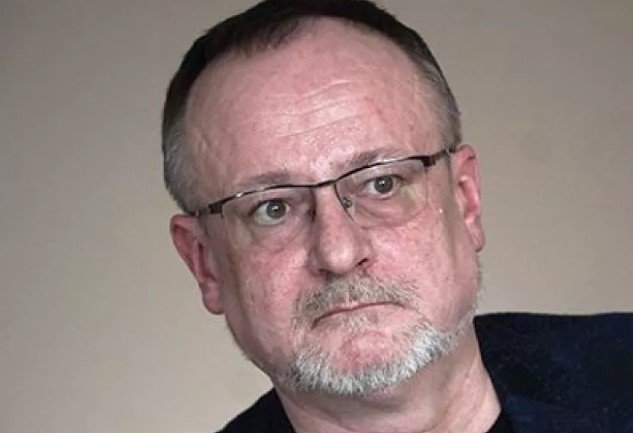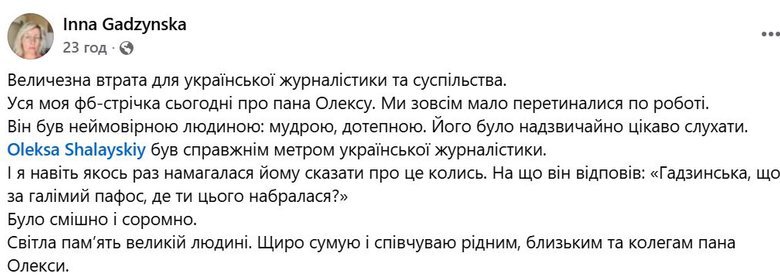Facts and meanings. Oleksa Shalaiskyi’s royal gambit
...Saturday morning in Kyiv’s Pozniaky district. I’m holding the phone, and my temples are pounding after the call, Oleksa Shalaiskyi passed away last night.
- His heart gave out, I don’t know the details, — my friend says sadly, then adds: — He was 58.
A few minutes later, a message from Khrystyna Berdynskykh appears:
"I can’t believe Oleksa is gone((((((( What a tragedy for all of us."
Yes, I reply, a terrible tragedy. It hurts.
My thoughts are all tangled, but I have to do something with them — because I need to write about Oleksa. Of course, I can’t express everything, but at least I must recall the essentials...
...Oleksa Shalaiskyi was, first and foremost, a complex, thoughtful person. Second, a Lviv native with many Galician traits. And third, a visionary. I say this in a half-whisper, God forbid Oleksa could hear it. He never overused such lofty words. In fact, he was meticulous in his choice of words, not for emotional effect, as many do, but to ensure that his phrasing would not distort what mattered most in his work: the facts and the meaning.
Shalaiskyi’s journalistic life can be divided into two parts. About the first one, he recalled in 2009:
"I spent almost 30 years in Lviv and 12 or 13 in Kyiv. In Lviv, I worked for the newspapers Ratusha and Postup, and for the TV company Mist; I even had the privilege of teaching at the university at the same time. In Kyiv, I was editor-in-chief at UTN, then at STB News, then editor of the Politics and Culture section in a magazine, and later editor of the Forum and ProUA websites. And so, I stayed on the Internet…"
An impressive list and others will speak later in this article about the editorial teams Shalaiskyi built and enriched with his presence. As for me, I believe Oleksa truly came into his own when he "stayed on the Internet" and, together with Yurii Nikolov, founded Nashi Hroshi ("Our Money").
At that time, both of them found it essential not to work for yet another media outlet owned by yet another oligarch. Even in 2010, it wasn’t hard to find sponsors in Ukraine some even relatively "clean." But Shalaiskyi made a deliberate choice: they would live on grant funding to stay independent of Ukraine’s corrupt rules of the game. The first grant came from Soros’s Renaissance Foundation. "That’s why," Yurii Nikolov laughs now, "we always bragged that we were true Sorosyata, born and bred!"
Very quickly, Nashi Hroshi became Ukraine’s all-in-one watchdog, a tender inspector, corruption investigator, and public educator. Without them, the transparent "broth" of technology and anti-corruption values that later led to the creation of Prozorro might never have formed.,,
Perhaps the most important contribution Oleksa and Nashi Hroshi made, for which Ukraine’s investigative journalism (and society as a whole) owes them gratitude was their opening of foreign corporate registries. Hard to believe now, but before Shalaiskyi, almost none of our journalists knew how to dig up company data from abroad from Britain, New Zealand, Cyprus, and elsewhere. Now, dozens if not hundreds do, thanks to the hands, minds, and teaching talent of both Shalaiskyi and Nikolov.
The pioneering mission of Nashi Hroshi inspired and helped nurture the investigative powerhouses we know today: Bihus.Info, the TV program Nashi Hroshi, Schemes, and Slidstvo.Info. Several NH alumni later strengthened other outlets, and this "circulation of Nashi Hroshi in nature" enriched Ukrainian journalism as a whole.
Meanwhile, some of the country’s most reputable media (first and foremost Dzerkalo Tyzhnia) published outstanding investigations by Shalaiskyi & Co. The most prominent ones exposed corruption during Yanukovych’s presidency: the infamous "Boyko rigs," the Transcarpathian Olympic scam, and the absurdly overpriced plastic boundary stakes, from the business empire of Yura Yenakiyevskyi, that the authorities planned to plant across the country. A few precisely crafted NH reports at that time actually saved Ukraine from a massive $500 million land-stake fraud...
What are Oleksa's favourite areas of anti-corruption intelligence? In addition to tenders, these are court registers and corruption schemes with state bailiffs at the Ministry of Justice. Shalaiskyi was a man who loved and knew how to work with documents like no other. This man generally adored systematicity and elegant precise wording - that's why he loved history, chess, Latin and other things that help our brains to function somehow behind the scenes of global chaos.
"Kuzmenko, as a humanities guy and a master of words, you should appreciate this," he would say with an ironic squint back when we worked together at proUA, then quote another proverb from Ancient Rome. That squint could apply both to the "master of words" and to the "master’s" actual ability to grasp the aphorism. But if you did understand and even liked it, Oleksa was genuinely pleased.
He wasn’t a saint, he had no tolerance for pompous fools or pompous bastards. He couldn’t stand when emotions drowned out facts, or when people were unwilling to learn and correct their mistakes. He could be indifferent toward diligent but talentless colleagues. With just one or two sarcastic remarks, he could bring someone back down to earth (or simply cut down someone he didn’t like). When he was angry, say at subordinates, he would speak quietly, slightly from under his glasses, but his words would hammer into your mind like nails. People would blush and think: better if he’d just yelled.
It happened to me a couple of times, too. And I’ve seen, more than once, people crying in newsroom corners after such talks. I know two who soon realized it would only get worse and decided to leave.
And yet my Facebook feed today, beyond grief and sorrow, is filled with words of respect, admiration, and gratitude. So many different people remember his charisma, his integrity, his sharp intellect, his ability to listen and hear what truly mattered. His exquisite irony — and, when needed, his lethal sarcasm. His distinct, unmistakable Shalaiskyi style. His gift for building brilliant teams. The sparkle in his eyes when something genuinely excited him. His way of praising you so that your mood would soar to the skies. His editorial magic: he’d reshuffle a few paragraphs, add several precise thoughts and a mediocre text would become good, while a good one turned brilliant.
Every other post calls Shalaiskyi a teacher, and the author, his student. Reading these panegyrics, he would’ve smiled ironically, said something witty, and started wiping his glasses, but deep down, he’d have been touched.
Oleksa Shalaiskyi truly was a Teacher. But to succeed in that role, he didn’t need pedagogical techniques, he needed people capable of analysis. That could happen anywhere: at lectures, training sessions, or just informal talks with out-of-town journalists and young talents. For many of them, the mere fact of having a conversation with Guru Oleksa became a defining moment in their lives.
Yurii Nikolov says:
"When I met Shalaiskyi about twenty years ago, I immediately got the impression that he’d hired half of Kyiv and fired the other half. Many people passed through his hands, and volens-nolens, they absorbed his way of analyzing things. Those who couldn’t accept his analytical approach eventually went their own way… And what he fundamentally gave people, what he found and ‘installed’ in them, was the ability to think and to analyze. I always valued and even envied his IQ and his complete composure: don’t get carried away, don’t get disillusioned. Stop. Breathe. Think. These, in my view, are the fundamentals of journalism."
In recent years, Oleksa had become less visible in the information space. His attention was devoted to his new family, his beloved wife and three children. The war, with its constant stress and anxiety, surely took its toll. And the 60-year mark was drawing closer. We don’t know what he thought or felt; for all his gift of communication, Oleksa Shalaiskyi was an introvert, carrying his inner world and his pain, both physical and emotional, within himself.
All the more bitter, then, to realize that he left us just as he and his colleagues at Nashi Hroshi were launching a new project. "It will deal with how false accusations of ‘aiding the enemy’ are being used to strip businesses of their assets and intimidate dissenters," Shalaiskyi wrote just a few days before his death.
His last Facebook posts struck me deeply. They carried more emotion than usual when he wrote about the authorities’ hunt for the Anti-Corruption Action Center or about the most cynical cases of "stripping businesses and intimidating the disobedient." It felt as if the dull, relentless pain of the world around him had begun to pierce his seemingly eternal armor of irony and historical parallels, that calm reminder of his: this has all happened before, no need to get too worked up.
Or maybe I’m now, standing before his virtual coffin, trying to make the facts fit the conclusion? Oleksa, by the way, never liked that…
I remember one of those evenings when I dropped by the Nashi Hroshi newsroom. There was a small gathering, conversations about a thousand different things. And then, a chess blitz, where Oleksa (who played at the level of a candidate master) acted freely, sometimes even recklessly, completely unlike his usual restrained positional play in longer matches.
"Let’s play the King’s Gambit!" he would announce, smiling, as he pushed his white pawn to f on the second move.
And instead of capturing the pawn and calmly defending, I’d somehow get carried away, laugh along with him and worsen my position, move by move.
"Once again, the King’s Gambit!" he’d say cheerfully before the next round.
…Thank you, my King. It was a brilliant and powerful game.
Yevhen Kuzmenko, Censor.NET






